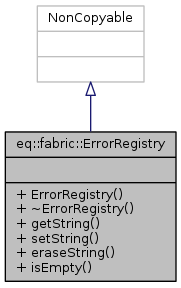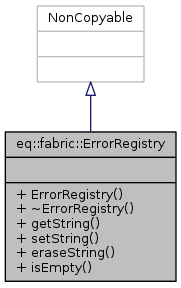The registry translating error codes to strings. More...
#include <errorRegistry.h>
 Inheritance diagram for eq::fabric::ErrorRegistry:
Inheritance diagram for eq::fabric::ErrorRegistry: Collaboration diagram for eq::fabric::ErrorRegistry:
Collaboration diagram for eq::fabric::ErrorRegistry:Public Member Functions | |
| const std::string & | getString (const uint32_t error) const |
| void | setString (const uint32_t error, const std::string &text) |
| Set an error string for the given error code. More... | |
| void | eraseString (const uint32_t error) |
| Clear a given error code string. More... | |
| bool | isEmpty () const |
Detailed Description
The registry translating error codes to strings.
Applications can register custom error strings starting at eq::ERROR_CUSTOM. Error registration and erasure is not thread-safe. Equalizer registers errors only during eq::init(). It is strongly advised to register application-specific errors before eq::init() and erase them after eq::exit().
- See Also
- co::Error, eq::Error
Definition at line 42 of file errorRegistry.h.
Member Function Documentation
| void eq::fabric::ErrorRegistry::eraseString | ( | const uint32_t | error | ) |
Clear a given error code string.
- Version
- 1.0
Referenced by eqPly::exitErrors(), and eVolve::exitErrors().
 Here is the caller graph for this function:
Here is the caller graph for this function:| const std::string& eq::fabric::ErrorRegistry::getString | ( | const uint32_t | error | ) | const |
- Returns
- the error string for the given error code.
- Version
- 1.0
| void eq::fabric::ErrorRegistry::setString | ( | const uint32_t | error, |
| const std::string & | text | ||
| ) |
Set an error string for the given error code.
- Version
- 1.0
Referenced by eqPly::initErrors(), and eVolve::initErrors().
 Here is the caller graph for this function:
Here is the caller graph for this function:The documentation for this class was generated from the following file:




 1.8.5
1.8.5